ASUS, BIOSTAR, GIGABYTE, and MSI Intel Z77 Motherboard Round Up
Wrapping it all up
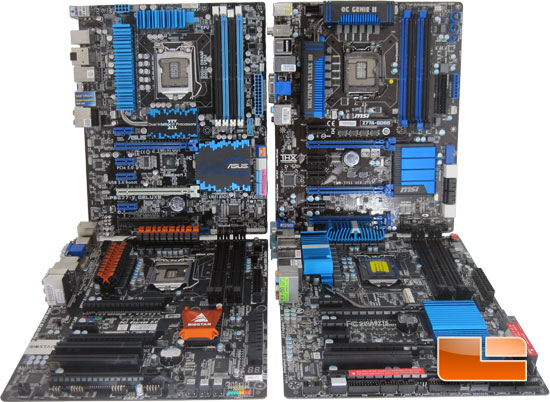
Overall the entire group of Intel Z77 motherboards that we looked at performed great. There was very little performance difference between the boards today. When it comes to gaming each and every one of them met our expectations. I almost feel disappointed by the overclocking ability of the Intel Core i7 3770K, though. Perhaps we have been too spoiled by Intel’s Sandy Bridge Processors being able to hit 5GHz and higher. It wasn’t that long ago that 4GHz was unobtainable by anything by extreme cooling. We have to remember that frequency isn’t everything anymore. There have been a number of changes to the processor architecture to make it run faster and more efficient. Nate has done an in-depth processor review comparing the new Intel Core i7 3770K processor to the usual suspects. He will be covering the architecture and performance here.
ASUS P8Z77-V Deluxe
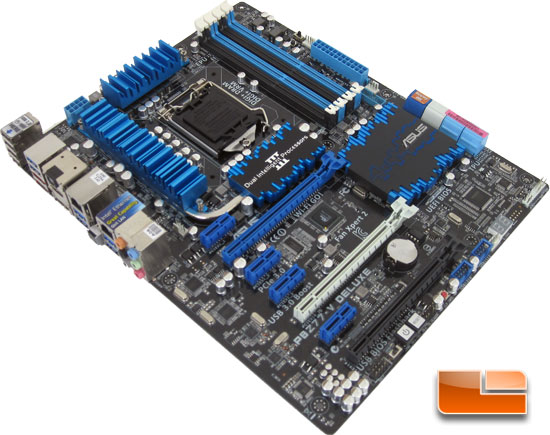
The ASUS P8Z77-V Pro is the most expensive Intel Z77 motherboard on the chopping block today. It carries a street price of $274.99 w/free shipping. The performance of the ASUS P8Z77-V Deluxe was consistently at the top of the charts today, only being edged out a couple of times. Where the ASUS P8Z77-V Deluxe truly shined was the SuperSpeed USB 3.0 testing. Without taking advantage of the ASUS USB Boost, the P8Z77-V Deluxe was already faster than the competition. Once we enable the Turbo mode, there was no competition! The Intel Z77 SuperSpeed USB 3.0 controller was nearly as fast as the performance we saw with the Corsair Force GT 240Gb SSD connected directly to the Intel Z77 SATA III 6Gbps ports!
While it may be the priciest motherboard today, it definitely has the performance to back it up. But is that enough to justify the price? Yes, at least in part. If you add in all of the features that come with the ASUS P8Z77-V Deluxe then the price is easily justifiable. There are a lot of features that are included in the AI Suite II that I didn’t have the chance to work with. One of them is the Fan Xpert 2. The ASUS Fan Xpert 2 intelligently scans and detects each of the fan characteristics to determine the minimum and maximum fan speed of each fan connected. Within the software you are able to assign a location to each fan and even rename it to whatever suites your needs, e.g.: CPU fan, Exhaust Fan, Corsair H100 or anything you want.
BIOSTAR TZ77XE4
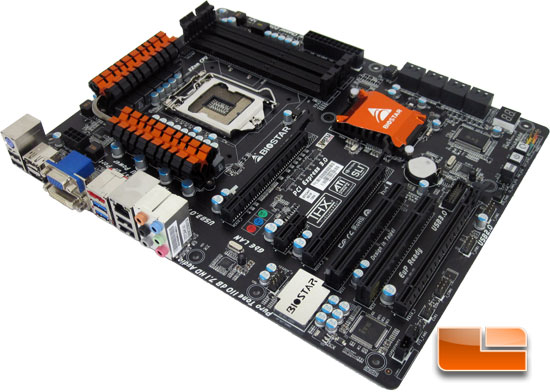
The BIOSTAR TZ77XE4 happens to be the lowest cost board that we tested today. By the performance though, you wouldn’t be able to tell that this would be considered more of a budget board. It wasn’t the fastest board that we have tested, but it was easily able to hold its own throughout the day. BIOSTAR doesn’t pack their motherboards with all the features that some of the boards have, but they also don’t carry a hefty price tag. The BIOSTAR TZ77XE4 retails for only $149.99 + Shipping! Where I was thoroughly impressed was the overclocking capability of the BIOSTAR TZ77XE4. I’m not talking about the V6 and V12 presets, those were pretty much useless. After all, the V12 preset which is the highest preset in the BIOSTAR overclocking utility, simply increased the Bclk by 4MHz which increase the Intel Core i7 3770K processor by 140MHz. That’s a far cry from the nearly 4.7GHz we saw with the GIGABYTE Z77X-UD5H EasyTune6 software.
There were a couple of quirks with the motherboard layout that I wasn’t wild about. The internal SuperSpeed USB 3.0 header is tucked behind the bottom PCIe x16 slot. If you are running an expansion card in that slot hiding the front panel SuperSpeed USB 3.0 cable a little tricky. It was the same type of situation with the front panel audio. The header for the front panel audio is centered right in front of the expansion slots. Once again trying to hide the cabling from the front panel will be difficult.
GIGABYTE Z77X-UD5H WiFi
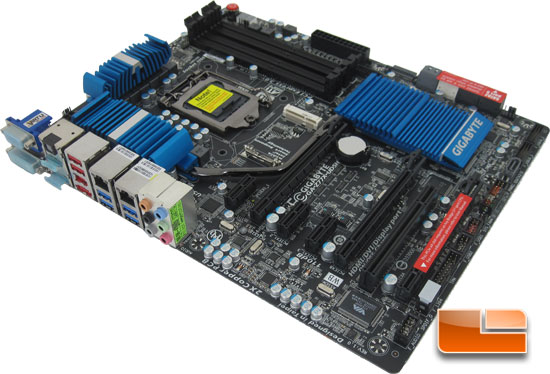
The GIGABYTE Z77X-UD5H WiFi takes the second spot in the price race, coming in at $216.61 + shipping it is obviously not for those on a tight budget. Not surprisingly we were happy with the performance of the Z77X-UD5H and it didn’t leave us disappointed in any aspect. One of the features I like about this board is the mSATA port. This will make it easy to pick up a small mSATA SSD and run Intel’s Smart Response Technology and see an almost immediate overall performance boost on your system.
The Gigabyte GA-Z77X-UD5H-WB WiFi is unique in the sense that it includes a PCIe expansion card that offers Bluetooth 4.0 and IEEE 802.11 a/b/g/n Wi-Fi connectivity. This board is obviously aimed at those with mobile devices like the Apple iPhone 4S that already support Bluetooth 4.0 for quick wireless data transfers. This board also features a 12 phase power VRM design that is cooled by a passive cooler that is interlinked with a heatpipe. We also like that the Gigabyte GA-Z77X-UD5H-WB WiFi has two LAN ports and that one of them uses an Intel GbE LAN chip. We’ve had good luck with Intel controllers and not all boards use them. For example the lower cost GA-Z77X-UD3H motherboard uses an Atheros GbE LAN chip. It also lacks the Marvell 88SE9172 SATA III 6Gbps controller that can be found on the GA-Z77X-UD5H-WB WiFi.
MSI Z77A-GD65
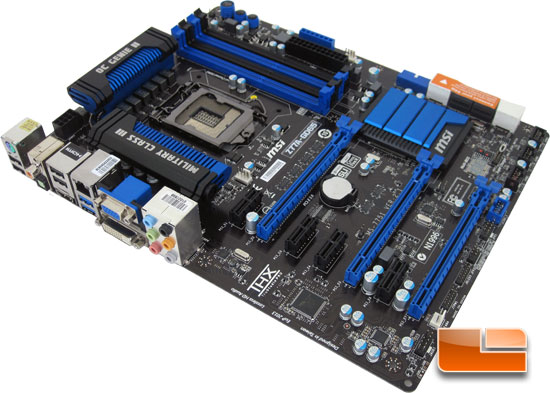
The MSI Z77A-GD65 rounds out our testing for the day. It carries a price tag of only $169.99 w/free shipping, which puts it in the same price range as the BIOSTAR TZ77XE4 once you consider the shipping costs. For the most part we would be able to switch the performance numbers around between the motherboards today and we wouldn’t be able to tell the difference, the performance really was that close most of the day. An area that did trouble me slightly was the voltage that we needed to overclock the Intel Core i7 3770K to 4.8 GHz on the MSI Z77A-GD65. On both the ASUS P8Z77-V Deluxe and the BIOSTAR TZ77XE4 we were able to hit 4.8GHz at 1.35 Volts. We had to set the CPU vCore to 1.4 Volts on the MSI Z77A-GD65. Had it been handy I would have liked to have checked the CPU vCore voltage with a multimeter, but that seems to have walked off for the time being. If that wasn’t missing it would have been easy to check the CPU vCore with the V-check points that MSI has placed on the Z77A-GD65.
Legit Bottom Line: The Intel Z77 motherboards we looked at today cover a wide range of price points. The ASUS P8Z77-V Deluxe has the widest array of features of all of the boards today, but it also carries the steepest price. The BIOSTAR TZ77XE4 doesn’t have nearly the features of the ASUS board, but it retails for $120 less. I wouldn’t hesitate to recommend any of these boards today, it all comes down to what features that you are looking for and what kind of budget you have for the heart of your computer!

Comments are closed.